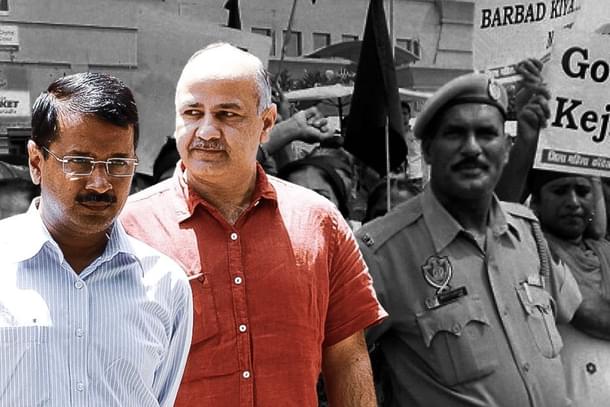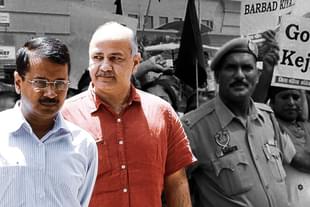News Brief
AAP's Delhi Liquor Policy Led To Over Rs 2,000 Crore Revenue Loss: CAG Report Tabled By BJP—Key Details Inside
Arjun Brij
Feb 25, 2025, 02:46 PM | Updated 02:45 PM IST
Save & read from anywhere!
Bookmark stories for easy access on any device or the Swarajya app.


The BJP-led Delhi government, under Chief Minister Rekha Gupta, presented the Comptroller and Auditor General (CAG) report on the Delhi Excise Policy in the Assembly on Tuesday (25 February).
According to ANI report, the ‘Performance Audit on Regulation and Supply of Liquor in Delhi’ examined liquor regulation and supply between 2017-18 and 2020-21, revealing severe lapses in policy execution, licensing, and enforcement.
The 2021-22 excise policy is estimated to have caused a cumulative loss of more than Rs 2,000 crore, as per the report.
This is one of 14 pending CAG audits that are reviewing the past Aam Aadmi Party (AAP) dispensation's performance.
The report revealed major discrepancies in regulatory checks of the Excise Department, due to which there was financial mismanagement and violations of policy. The overall financial implication of these observations stands estimated at Rs 2,026.91 crore.
How This Was Done
One of the most serious transgressions indicated was the department's non-enforcement of Rule 35 of the Delhi Excise Rules, 2010, which prohibits related parties from holding more than one liquor licenses—wholesaler, retailer, and hotel/restaurant category.
This loophole enabled companies sharing common directorships to corner the liquor business, skewing market competition.
The process of issuance itself was tainted with irregularities. The audit determined that licenses were given out without checking for solvency, audited accounts, wholesale price declarations in other states, or even criminal records.
The Excise Department also allowed the L1 licensees (manufacturers and wholesalers) to self-determine their Ex-Distillery Price (EDP) without control, resulting in price manipulations and revenue losses.
The audit noted that “discretionary EDP led to decline in sales and consequent loss in excise revenue,” as price variations across states enabled wholesalers to inflate costs and profits.
Mechanisms of quality control were grossly deficient. The Excise Department did not ensure liquor supplied in Delhi was of fixed quality.
Although Bureau of Indian Standards (BIS) rules mandate test reports relating to water quality, toxic ingredients, and methyl alcohol presence, there were several brands that provided outdated or nil reports.
Among foreign liquor samples examined, 51 per cent were found to have test reports older than a year or had no date stamps at all, causing grave concerns for consumer safety.
Other Irregularities
Regulatory enforcement was also criticised in the report. The Excise Intelligence Bureau (EIB) did not act as an effective deterrent as there was weak data management and patchy enforcement action.
There were random raids that did not follow standard procedure and legal cases against them suffered through poor evidence-gathering and defective inspection reports.
Further, serious faults existed in tracking the inventory. Failing to carry out barcode scanning for liquor sale resulted in incorrect stock reconciliation with a greater threat of non-duty-paid liquor ending up in the market.
The Excise Adhesive Label project to augment security and guarantee authenticity never made it out and left considerable openings in monitoring supply chains.
The design and implementation of the excise policy were also criticised. Though the policy sought to avoid monopolies and cartelization, its framing limited the number of licensees, leading to exclusive relationships among manufacturers and wholesalers.
The erstwhile 2020-21 policy granted wholesale licenses to 77 Indian-made foreign liquor (IMFL) producers and 24 foreign liquor suppliers. The new policy consolidated this into mere 14 units, severely constricting competition.
For off-the-counter retail liquor vends, Delhi was demarcated into 32 zones, and 849 vends were allotted to only 22 entities, replacing the previous system in which government corporations held 377 vends, and 262 were allotted to private individuals.
When a few retailers returned licenses prematurely, non-provision of advance notice-led supply gaps took place. The government's inability to retender these licenses left an estimated Rs 890 crore on the revenue table.
Implementation failures led to further financial losses. Exemptions granted to zonal licensees resulted in revenue losses of Rs 941 crore.
Despite policy terms stating that commercial risks lay with licensees, a Rs 144 crore waiver in license fees was granted due to COVID-19 restrictions, adding to government losses.
The report concluded that Delhi’s excise policy failed to meet its core objectives, including preventing bootlegging and ensuring liquor safety.
Planned actions like establishing liquor testing labs and batch testing for quality control were never executed.
The findings have serious implications for financial mismanagement, policy integrity, and public safety in the capital city's liquor trade.
Arjun Brij is an Editorial Associate at Swarajya. He tweets at @arjun_brij




